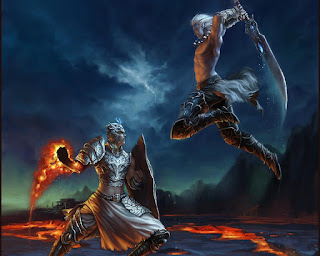This is the final entry in the PinkFae Archives. It is also the final entry in the 'How to GM' series. It was originally published on 18 February 2017.
Player conflict is a problem that all GMs must face at least once in their life. It may result from any number of causes. But regardless of the cause, it can result in a total disintegration of the gaming group. Even if everything else is going well, two players (or their characters) being antagonistic towards one another can ruin the game for everyone.
Ideally, you'll be able to assemble a group that gets along well enough that this won't be an issue. But sometimes, no matter what you do, two people may develop an insurmountable conflict in the course of playing. Even worse, a disconnect may arise between a player and you, the GM. How do you handle this situation?
In today's entry, we'll look at ways to minimise potential player conflict, and how to handle it when it does happen. Whether vetting potential players or mediating between players once the game has started, there are always ways to avert this possible crisis.
Showing posts with label GMing. Show all posts
Showing posts with label GMing. Show all posts
14 December 2019
26 October 2019
PinkFae Archive #49: How to GM Part 8: The End of a Game Session
Today we have another entry from the PinkFae archives. This article is part of the 'How to GM' series. It was originally posted on 14 January 2017.
The evening is drawing to a close. The session is ending. You're nearing the end of the time allotted for tonight's game. All done, right? Time to say, 'See you next session!' and pack up your stuff and go?
Not quite.
The end of a game session is at least as important as the beginning. Before you call it a night, there are a few important details that you should cover. In this entry, we shall look at some of the essential issues to consider at the end of your session.
The evening is drawing to a close. The session is ending. You're nearing the end of the time allotted for tonight's game. All done, right? Time to say, 'See you next session!' and pack up your stuff and go?
Not quite.
The end of a game session is at least as important as the beginning. Before you call it a night, there are a few important details that you should cover. In this entry, we shall look at some of the essential issues to consider at the end of your session.
24 August 2019
PinkFae Archive #45: How to GM Part 6: Beginning a Campaign or Session
Today we have another entry from the PinkFae Archives. This one is another installment in the 'How to GM' series. It was originally published on 10 December 2016.
Last time, we talked about running a game session. However, there is an important corollary that goes along with this idea. That is the the understanding of how to begin a game session. But this concept of a beginning doesn't apply exclusively to game sessions: the beginning of a campaign is just as important (in some ways, more so!). So we're going to talk about beginning things in today's session.
For those less familiar with gaming, a trope exists about most campaigns beginning in a tavern. The location of the beginning is less an issue than the nature of the characters themselves. I wrote an in-depth discussion of the concern on my other blog. In short, the first session of a campaign often starts with the characters, who have never met, in the same tavern. There are problems with this approach, which we will discuss later in this article. The important point here: the beginning of a campaign or game session is very important.
Last time, we talked about running a game session. However, there is an important corollary that goes along with this idea. That is the the understanding of how to begin a game session. But this concept of a beginning doesn't apply exclusively to game sessions: the beginning of a campaign is just as important (in some ways, more so!). So we're going to talk about beginning things in today's session.
For those less familiar with gaming, a trope exists about most campaigns beginning in a tavern. The location of the beginning is less an issue than the nature of the characters themselves. I wrote an in-depth discussion of the concern on my other blog. In short, the first session of a campaign often starts with the characters, who have never met, in the same tavern. There are problems with this approach, which we will discuss later in this article. The important point here: the beginning of a campaign or game session is very important.
27 July 2019
PinkFae Archive #42: How to GM Part 4: Running the Game Session
Today, we have another installment of the PinkFae Archives. This article is the next in the 'How to GM' series. It was originally published on 19 November 2016.
Finally, the time has come to play! You've assembled a gaming group and you've chosen a game. You designed the campaign, and you're ready with the story for the first session. Now you're sitting at a table with your friends, dice nearby, and the players all look at you. What do you do now?
Finally, the time has come to play! You've assembled a gaming group and you've chosen a game. You designed the campaign, and you're ready with the story for the first session. Now you're sitting at a table with your friends, dice nearby, and the players all look at you. What do you do now?
08 June 2019
PinkFae Archive #37: How to GM Part 4: Preparing a Game Session
This entry was part of the 'How to GM' series on PinkFae. It represents a brief break in the entries about Gen Con. It was originally published on 15 October 2016.
I have one more post to write on Gen Con. But we've been hearing about Gen Con for months now. Let's take a break before we finish it up. It's been a long time since we've had any installments on the Analysis of GMing series. Let's get another one of those in! This time, we'll talk about planning a game session.
So you've chosen a game, gathered a group of players, and have a design for the overall campaign. It's time to start getting into the nitty-gritty. Before you meet up with your players for that first session, you need to know what's going to happen in that session. So let's take a look at that.
 |
| A swan telling a story. Much like the GM tells a story to the players in a game session, often of fantastical tales, such as a swan telling stories. |
So you've chosen a game, gathered a group of players, and have a design for the overall campaign. It's time to start getting into the nitty-gritty. Before you meet up with your players for that first session, you need to know what's going to happen in that session. So let's take a look at that.
25 August 2018
Advice for a First-Time GM
Recently, one of the players in my Fate group asked me for advice on how to GM. She had some friends who wanted to play, but there wasn't room in my group for new members (I have a hard limit of six players plus the GM on any games I run). So instead, she decided to run a game for them herself.
I wrote her a fairly lengthy email full of advice, and it later occurred to me that it might be the sort of thing that could be useful to others. So I will adapt the information I wrote in that email into an entry, and share it with you.
I will point out that as we get further into the PinkFae archives, there will be a series of articles entitled 'Analysis of GMing,' which will have a lot of advice that will be useful to the first-time GMs. But that series isn't targeted specifically at new GMs, and it's still a couple months out (the first entry is going to be Archive #22, and we just had #17 last week, so it's going to be about four months from now). So we'll start here, and as more information comes out, it will be additional advice to add onto what you're about to read!
I wrote her a fairly lengthy email full of advice, and it later occurred to me that it might be the sort of thing that could be useful to others. So I will adapt the information I wrote in that email into an entry, and share it with you.
I will point out that as we get further into the PinkFae archives, there will be a series of articles entitled 'Analysis of GMing,' which will have a lot of advice that will be useful to the first-time GMs. But that series isn't targeted specifically at new GMs, and it's still a couple months out (the first entry is going to be Archive #22, and we just had #17 last week, so it's going to be about four months from now). So we'll start here, and as more information comes out, it will be additional advice to add onto what you're about to read!
24 March 2018
GMing for New Players
A local medieval re-enactment group recently held a special event, and I chose to take part. Specifically, the group hosted an RPG night; several people volunteered to GM a one-shot introductory game, and the others chose one of those games to play. The idea was to give veteran gamers a chance to play, if only briefly, and to give players an opportunity to experience a new system, and to give newbies the prospect of getting a taste of tabletop roleplaying games for the first time.
In case you're curious, there were six total GMs, running the following games: Dungeons and Dragons (because of course), Pathfinder, Starfinder, a Star Wars game using a modified Warhammer 40K system, Changeling: The Dreaming, and Fate Core. Surprisingly enough, I was not the one running Changeling: someone else had already offered to run that one, so I ran Fate instead.
But here's what I thought was interesting: a good friend of mine was very nervous about playing. She ended up joining my Fate game, but in the weeks leading up to the event, she asked me several times if it would be a problem that she had never really gamed before (technically, she had, but only in a limited way... more on that in a moment). I reassured her that I was very familiar with GMing for newbies, and had introduced quite a lot of people to the hobby over the years.
In case you're curious, there were six total GMs, running the following games: Dungeons and Dragons (because of course), Pathfinder, Starfinder, a Star Wars game using a modified Warhammer 40K system, Changeling: The Dreaming, and Fate Core. Surprisingly enough, I was not the one running Changeling: someone else had already offered to run that one, so I ran Fate instead.
But here's what I thought was interesting: a good friend of mine was very nervous about playing. She ended up joining my Fate game, but in the weeks leading up to the event, she asked me several times if it would be a problem that she had never really gamed before (technically, she had, but only in a limited way... more on that in a moment). I reassured her that I was very familiar with GMing for newbies, and had introduced quite a lot of people to the hobby over the years.
Subscribe to:
Posts (Atom)








